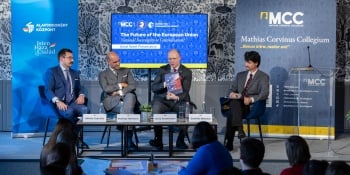Published: 02.05.2022

· The final recommendations of the Conference on the Future of Europe (CoFoE) have been published in recent days. They are aimed at further federalization of the European Union.
· The conference was promoted as a platform for public debate enabling citizens to express their views on the future of the European Union.
· In fact, CoFoE was intended from the outset to create the illusion of democratic legitimacy for the changes planned in the EU by the federal community.
· The recommendations include the postulate of depriving member states of the right of veto in the EU Council, the creation of supranational electoral lists, the unification of the electoral law to the European Parliament in all countries, or the development of an "EU constitution".
· In opposition to manipulation, an entire faction of European Conservatives and Reformists withdrew from the Conference.
· The Ordo Iuris Institute produces a comprehensive analysis of all CoFoE recommendations.
· On May 4, the Institute will take part in a debate in the European Parliament in Strasbourg on the dangers of CoFoE, organized by the Identity and Democracy faction.
We already know the recommendations made as part of the summary of the Conference on the Future of Europe (CoFoE), i.e. a project that for a year was supposed to be a place of meeting and debate with the public on the challenges and priorities facing the EU. The Conference itself enjoyed little public interest and did not break through to greater public awareness. In fact, CoFoE was intended from the outset to create the illusion of social legitimacy for the changes planned in the EU by advocates of a federal state. The conference was supposed to give the impression that there is a social consensus on the future of Europe, a common desire for all to centralize power in Brussels and to further reduce the role of the Member States.
Recently published CoFoE recommendations include introduction of joint supranational electoral lists for elections to the European Parliament. This postulate, placed next to the proposal to unify the electoral laws of the member states, not only raises concerns about interference in elections in these countries, but is a straightforward way to entrust election processes to the central management from Brussels. The enigmatically formulated recommendations allow for an extremely broad interpretation in the future, which should additionally increase concerns about the scale of changes in the federal direction that the EU wants to implement. The proposal to introduce deputies from "international" lists to the EP does not provide information as to whether these deputies - as "more" legitimate - would be granted wider powers. Along with the proposal to grant the EP a legislative initiative, the whole appears as an attempt to create an apparent democracy that will be controlled by politicians placed by political groups on "international electoral lists", which will give almost 100% election.
Another, revolutionary and diametrically changing EU recommendation is the abandonment of unanimous voting in the EU Council in favor of a qualified majority. According to this idea, the only exceptions should concern the admission of a new country to the EU and the change of the basic EU principles set out in Art. 2 TEU and the Charter of Fundamental Rights of the European Union. This limits the exclusion of the veto right that each member state has today when the Council of the EU takes decisions on matters considered by member states to be delicate. It is precisely the right of veto that may allow Poland to defend itself against the ongoing attempt by the EU to impose the necessity to recognize same-sex parentage. The constant opposition of countries such as Poland, which block harmful ideological ideas in the EU Council, is the real reason why the EU is so hard to abolish the principle of unanimity. Officially, the EU calls it "improving the decision-making process in the Council". Among the numerous recommendations of CoFOE there is also a postulate to introduce a referendum around the EU or a return to the concept of establishing an EU "constitution".
As a protest against the shape of the Conference and the published "final demands", the entire group of European Conservatives and Reformists withdrew their participation in the Conference, directly pointing to the lack of transparency, the truncated and adjusted to future "conclusions" selection of participants and disregard of citizens' recommendations.
It is no coincidence that both the inauguration and the end of CoFoE will take place on May 9, i.e. on the anniversary of the Robert Schuman declaration, considered a fundamental document of the European Union. Schuman himself wrote about European integration that “It's not about joining states, it's about creating a superstate. Our European countries are a historical reality; it would be psychologically impossible to make them cease to exist. Their diversity is even very beneficial and that is why we do not want to eliminate or equalize them". At the same time, both in documents (e.g. the White Paper on the Future of Europe of 2017), and during the conference, the communist Manifesto from Ventotene is indicated as the ideological basis for the functioning of the EU.
“From the beginning of the Conference on the Future of Europe, it was known that its aim is to create the ground for further federalization of the EU. The left-wing EU factions used this event to create the illusion of debate and equality in discourse. In fact, the allegedly consensual recommendations to summarize a Conference that spanned many months and covered hundreds of events is a complete list of the radical left-wing ideas like the EU that we have known in principle before. The difference is that today these postulates are presented as <<conclusions>> obtained by consensus of all - because the Conference theoretically gave the opportunity to express one's arguments "- comments Anna Kubacka, the analyst at the Ordo Iuris Center for International Law.
The Ordo Iuris Institute is already working on a comprehensive commentary on the published CoFoE recommendations. The Institute will share its initial comments on May 4 in Strasbourg, where, at the invitation of the Tożsamość i Demokracja group, the director of the Ordo Iuris International Law Center, Weronika Przebierała, will take part in the discussion on CoFoE and the future of the EU.

• Representatives of Ordo Iuris took part in the second round of consultations ahead of the 58th Session of the UN Commission on Population and Development (CPD58) on global health policy.

09.04.2025
• On April 8, the Ordo Iuris Institute presented the Polish version of a document with proposals for reforming the European Union, prepared jointly with Hungary’s Mathias Corvinus Collegium (MCC).


• The European Union’s Council Conclusions on EU Priorities in UN Human Rights Fora in 2025 identify key areas of EU human rights activities at UN fora and refers to several universal human rights, such as freedom from torture and freedom of religion or belief.